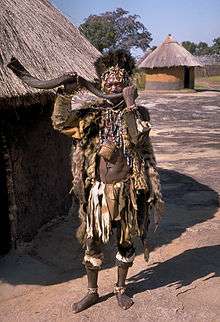Definify.com
Webster 1913 Edition
Shaman
Sha′man
,Noun.
[From the native name.]
A priest of Shamanism; a wizard among the Shamanists.
Webster 1828 Edition
Shaman
SHAM'AN
,Noun.
Definition 2025
shaman
shaman
See also: shamán
English

A shaman
Noun
shaman (plural shamans)
- A traditional (prescientific) faith healer.
- A member of certain tribal societies who acts as a religious medium between the concrete and spirit worlds.
Usage notes
- The plural form is shamans, not shamen;[8] the etymologically-consistent plural form from the original Evenki is shamasal,[9] but this form sees no use in English; the plural form shamans is, however, universally accepted.[10]
Derived terms
- shamaness
- shamanism
- shamanize
- shamen (hypercorrect plural)
- technoshaman
Synonyms
- (religious medium): priest-doctor, witch doctor
Translations
a medium between the concrete and spirit worlds
|
|
References
- 1 2 “shaman” in Dictionary.com Unabridged, v1.0.1, Lexico Publishing Group, 2006.
- ↑ “shaman” in Merriam-Webster Online Dictionary, Merriam-Webster Online.
- 1 2 Fortson, Benjamin W. (2010) Indo-European Language and Culture: An Introduction, second edition, Oxford: Blackwell
- ↑ this theory is ascribed by several other sources to the OED
- 1 2 “shaman, n. (and a.)” listed in the Oxford English Dictionary, second edition (1989)
- 1 2 3 “shaman” listed in Merriam–Webster’s Online Dictionary (retrieved on 19 September 2008)
- 1 2 “shaman” listed in The American Heritage Dictionary of the English Language, 4th edition (2000)
- ↑ 1978, Carl B. Compton, The Interamerican, volume 25, №3 (Instituto Interamericano, Denton, Texas) We learn from our readers: We have been wrong in writing the word “shamen” as a plural for “shaman”. The word probably comes from Russian and there is no plural except that made by adding an ‘s’ — e.g. Shamans.
- ↑ 2003, Howard Isaac Aronson, Dee Ann Holisky, and Kevin Tuite, Current Trends in Caucasian, East European, and Inner Asian Linguistics — “Dialect Continua in Tungusic: Plural Morphology”, page 103 (John Benjamin’s Publishing Company; ISBN 1588114619) […] we note here that -sal tends to exist only as a residual plural marker in -l/-r dialects. For example, in Standard Evenki, as in the Evenki dialects of the Amur basin and the Vivin dialect, use of -sal is limited to a small number of nouns (e.g. bajan “rich person”, pl. bajasal; ɲami:, “female reindeer”, pl. ɲami:sal or ɲami:səl; aβlan “field”, pl. aβlasal; sama:n “shaman”, pl. sama:sal).
- ↑ 2005, Peter Metcalf, Anthropology: The Basics, box 7.3: “Shamanism”, page 132 (Routledge; ISBN 0415331196) Note that the plural of shaman is shamans, not shamen.